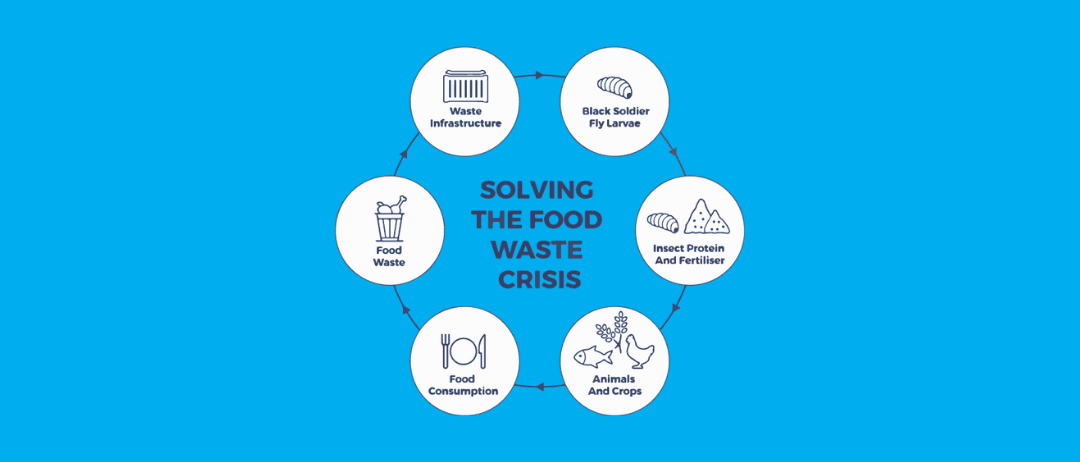This article was provided by Goterra.
Globally, one third of all food produced is wasted. It’s a total of 1.3 billion tonnes of food and costs the global economy c.$940 billion every year. That’s criminal. Particularly when we know that one in six people currently go hungry, and we need to produce 50% more food by 2050 to feed the growing population.
In Albury-Wodonga over 6,000 tonnes of commercial food waste is produced every year. Right now, 95% of it goes to landfill. That’s also criminal. But it’s about to change.
AlburyCity Council is working in partnership with Goterra, Woolworths, and Veolia in a project funded by a NSW EPA Circulate Industrial Ecology Grant to establish organic waste management infrastructure. The approach uses black soldier fly larvae to consume the food waste, converting it into insect protein and frass, which can be used in Australian agriculture.
Using insect larvae to process waste is the lowest impact way to do it. It reduces the impact of landfill by 97% and has one-third of the impact of composting. Insects eat large quantities of low-grade organic waste and transform it into high grade protein that can be cycled back into the economy as animal feed or pet food.
It is a transformational approach that is revolutionising the way we treat food waste. We are building a circular economy and sustainable food system right here in Albury-Wodonga.
The Albury-Wodonga Circular Economy
AlburyCity Council has a strong history of developing solutions to our waste problems. The Albury Waste Management Centre is an award-winning facility and is considered one of the leading waste management sites in Australia.
Goterra uses decentralised infrastructure to manage organic waste, housing larvae in a shipping container at the Albury Waste Management Centre. It’s a clever approach, because we can increase the capacity by adding more containers as necessary, meaning that we do not have to invest in large scale processing capacity up front.

This project will divert, treat and convert organic waste into new products, upcycling organic materials into useful agricultural inputs, keeping nutrients in the economy for longer, reducing food waste sent to landfill, and extending the lifespan of the landfill site.
The collaboration delivers the following benefits:
- Simultaneously reduces greenhouse gas emissions from food waste and creates sustainable new products (insect protein and soil enhancer).
- Extends the life of the Albury Waste Management Centre landfill site.
- Supports commercial waste producers to introduce circular economy practices.
Why get involved?
Here’s three good reasons to get involved.
1. Getting your waste out of landfill enables you to tell a good story to your customers and your employees, both of whom more than likely want to see you do this. Goterra helps you tell your story by providing data outlining the volume of waste you’ve produced, and carbon savings from participating.
2. It reduces our reliance on landfill, extending the life of the Albury landfill as well as reducing the impact of the waste. Every year approximately 200,000 tonnes of material is received at the Albury Waste Management Centre, more than half of which is diverted. While commercial food waste has been slow to start, we are delighted to be making the change. AlburyCity has set an ambitious carbon reduction goal to be Net Zero by 2040. Reducing organics to landfill is a substantial focus.
3. Legislation being drafted by the NSW Government, if passed, will see source separation of organic waste required for selected retail and hospitality businesses. The unit can process any organic waste, including meat and dairy, regardless of whether it is packaged or contaminated – so this can support all businesses in Albury-Wodonga to meet the requirements.
In short, it’s good for your business, it’s good for the Albury Waste Management Centre landfill, and it helps you prepare for incoming legislation.
It comes online in January 2022 and will process a range of organic waste, including (but not limited to)
- Packaged food waste from retail
- Post-consumer food waste from hospitality and institutions
- Food production waste
For more information or to sign up please contact waste@goterra.com.au
This project is a NSW Environment Protection Authority, Waste Less Recycle More initiative funded from the waste levy, the largest waste and recycling funding program in Australia.

